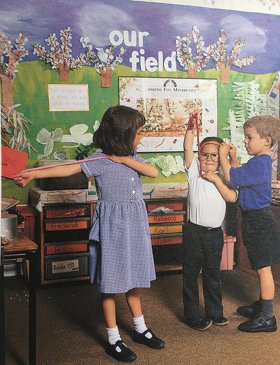In this article, a Woolacombe School Y6 teacher described the maths that came out of a ‘Fermi’ problem after visiting a beach with his class: “If I picked up one grain of sand per second, what year would it be when I finished?”
They spent several lessons exploring this question, engaged and enthused by the maths and calculating with huge numbers in their attempts to solve the problem. What I found interesting was that afterwards, the teacher outlined the curriculum areas that the children drew on, developed or learned about:
- multiplication
- multiplying and dividing by multiples of ten
- volume
- estimating
- relative size of large numbers
- conversion between different units of time
I'm sure this class will remember this maths activity many years later. Much of my early teaching experience followed this approach, engaging children with a ‘hook’ or problem to explore, with learning sometimes extending over several weeks.
I would prompt and teach when necessary to support the learning, and at the end of the problem when I talked to the children about the learning that had taken place it was always with a feeling of great satisfaction and achievement. That was from me and from the children.
Derek Haylock has written about 'the two dimensions: attainment and experience’, in his excellent book ‘Strategies for Teaching Low Attainers in Mathematics’. He gives the following two approaches that are often regarded as opposing curriculum models:
Take a look at 'Inspiring your class with maths - give a problem within a context' for ideas on where to find problems and investigations and advice on setting them around a theme.
The objectives-and-assessment approach: specify a sequence of objectives to be attained by the pupils, assess the pupils’ current attainment against these objectives, and then design a learning programme to move them forward.
The experiences approach: identify meaningful situations and genuinely purposeful activities in which pupils can develop their mathematical skills and confidence.
I agree with Derek Haylock that these should be seen as complementary to each other, not as alternatives. We have a great opportunity for this now, as we become more skilled at using learning objectives, expected outcomes and small progression steps. These provide short-term goals for children’s learning, building on from what they already know in small, managed steps.
We then need to balance this with providing plenty of opportunities for children to explore, solve problems and investigate. These may or may not match specific objectives for that particular week, but they can use and extend the maths, giving children the chance to fly with it and challenge themselves.
These are ideal if they follow teaching sequences where skills and concepts have been taught and practiced, so they can then apply these (along with other maths content) in a context. At the end of it all you can look back at all the learning with a child and just go ‘Wow!’ together.



